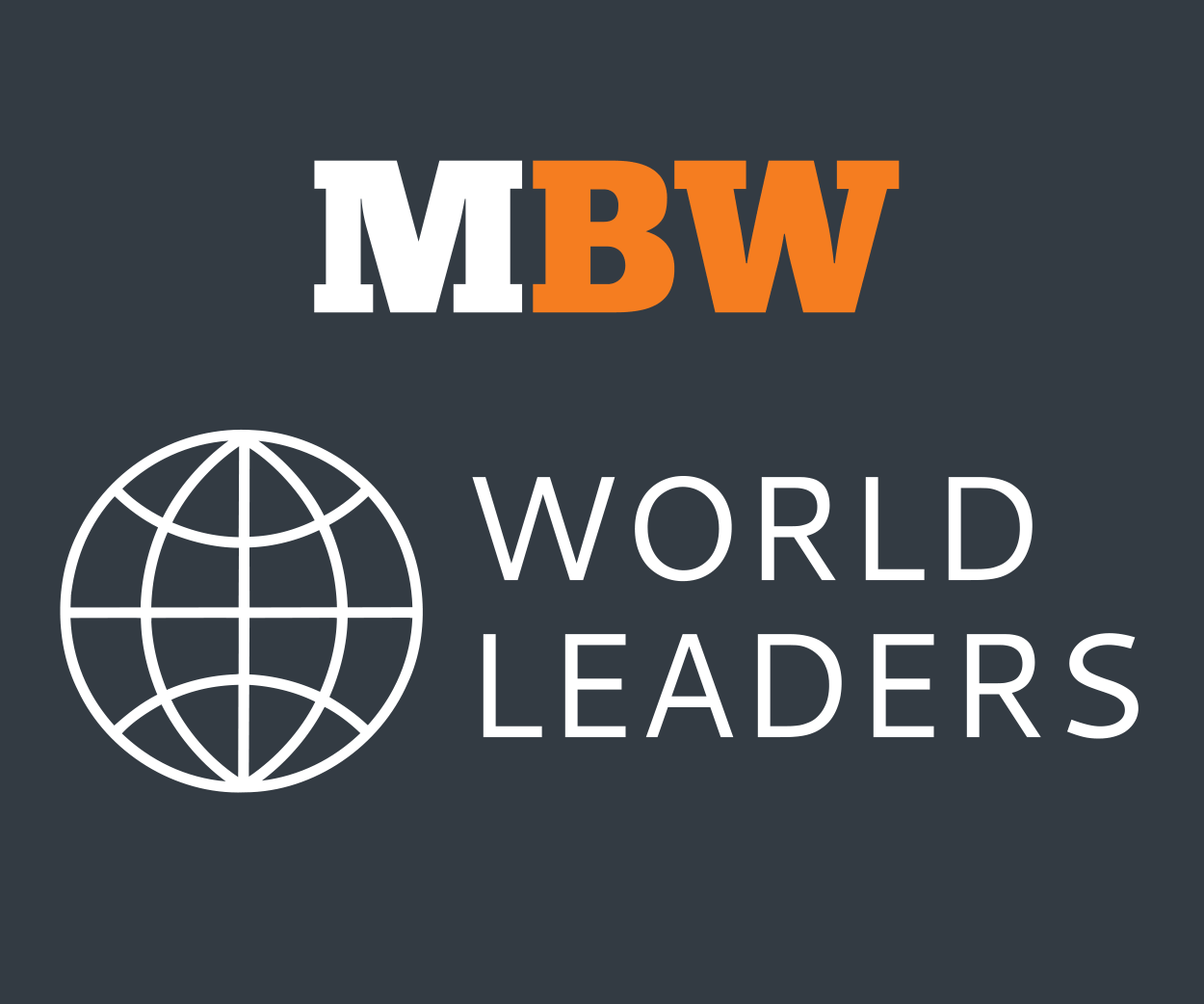MBW’s World Leaders is a regular series in which we turn the spotlight towards some of the most influential industry figures outside the US and UK markets. In this feature, we speak to Frank Briegmann, Chairman & CEO of Central Europe for Universal Music and Deutsche Grammophon. World Leaders is supported by PPL, a leading international neighbouring rights collector.

In the past few years, we’ve seen record companies expand into merch, video games, and even hip-hop blogs. Now we’ve seen them expand into frozen pizza, too.
Universal Music Germany is the record label home of Capital Bra, one of Germany’s most successful rap artists, with over 5 million monthly Spotify listeners and over a billion views on his YouTube channel.
In May last year, thanks to a deal brokered by UMG, Capital Bra launched his Team Capi / Gangstarella range of frozen pizza. It quickly sold out in stores, and has to date sold over 5 million pizzas across Germany.
For Frank Briegmann, Chairman & CEO of Central Europe for Universal Music, the success of Gangstarella speaks volumes about the innovation being fostered at UMG in the region.
In fact, Briegmann, who is also CEO of Deutsche Grammophon, says the past 18 months – despite its obvious challenges – has provided UMG’s EU operation with the impetus and opportunity to try new ways of doing things…
Let’s start with Germany: Recent market figures showed an increase in market revenues, despite the pandemic in 2020. Commercially speaking, what was Universal’s experience of the 12 months?
The German music market has been growing steadily for years, even though it is still a bit slower on the transformation curve towards streaming compared with other major markets.
Over the last few years, we have broadened our approach towards domestic A&R to support all areas of the market, but especially to embrace and lead the evolution of streaming here. In Germany, streaming is currently at a share of around 65%, with a dynamically growing penetration rate that also shows its potential for the future.
“We have broadened our approach towards domestic A&R to support all areas of the market, but especially to embrace and lead the evolution of streaming in Germany.”
Universal Music has made a significant contribution to this market growth in recent years. In 2020 we achieved very high chart market shares thanks to both fantastic international repertoire, and an even greater share of domestic chart success.
Of course, the pandemic affected how we could release certain projects in 2020, but we increased the number of streaming releases, whilst holding back some domestic artist projects where there was a strong demand for physical product amongst fanbases.
How has your market strength in Germany evolved and what’s been the key to maintaining/growing this in recent years?
Most important of all is the way that we do this as a team, and a key ingredient to this success are the trust-based and long-term relationships we have established and developed with our artists and our partners in Germany and around the world.
We continually strive to evolve the company and the market environment in order to further enhance the quality of services, innovation and the creative input we can provide to our artists, such as with the launch of our Marketing Labs Division a few years ago.
“We work closely with the other UMG operations to ensure our hits can reach the widest possible audience around the world.”
We have launched and created different labels as touch-points for the local urban/hip hop scene when we saw that genre thriving; we built a huge backbone on digital experts to meet the explosive number of distribution and communication channels; we boosted our resources in D2C and eCommerce and created lots of deluxe products for the market.
Additionally, we emphasized and increased our international marketing efforts, since the chances to have global hits from Germany and the European continent has increased significantly in recent years, and we have found success with several breakthrough artists (Lewis Capaldi, Meduza, Topic, Zoe Wees to name a few).
Through this success, our amazing team has acquired a reputation, which is increasingly compelling international artists to sign with us in Berlin and to trust us with their global careers, and we work closely with the other UMG operations to ensure our hits can reach the widest possible audience around the world.
The pandemic has caused a lot of misery, but also pushed businesses to innovate and make the most of shifting consumer trends. What did you learn in this regard, and what were your biggest achievements?
The pandemic offered us the challenge to modify our workflows, which was an intense process but necessary to serve the artists best during lockdown times and also prepare ourselves for a post-pandemic time that will see us working in much more flexible and mobile ways.
Almost overnight, we switched our internal structures to new forms of collaboration that are almost completely digital, achieving a degree of flexibility which will benefit us and our artists now and in the future.
“To me, it is our biggest success that we have been able to give our artists and partners the biggest possible degree of stability and reliability during these uncertain and often stressful times.”
In order to help our artists to mitigate against the ramifications of the culture lockdown across Europe, which has been a reality for well over a year now, we have strived to help create new formats. An example of this is DG Stage – an innovative concert platform, which provides fans of classical music with an opportunity to enjoy exclusive live experiences into their homes whilst concert halls have remained closed and help provide artists with an alternative income stream.
To me, it is our biggest success that we have been able to give our artists and partners the biggest possible degree of stability and reliability during these uncertain and often stressful times.
Specifically on the Capital Bra pizza tie-up: How successful has this been, and do you think it tells us anything about the opportunities afforded to artists who sign with major record companies vs. those who remain independent?
Without question, this has been one of the most successful artist brand collaborations in recent years, and one that really connected and resonated with fans across Germany. In the year since the TeamCapi #Gangstarella project launched, he has sold more than 5 million pizzas, launched four flavours and won a bestseller award for Germany’s most successful new product in 2020 in the food sector. He actually earned a gold pizza earlier this year – although at 5 million sales, he is probably due a multi-Platinum pizza now!
More importantly though, the success of this project speaks to the innovative power that can emerge out of great partnerships. I think that is definitely one of our strengths as a major music company: the ability to support and leverage the power of artists to align with global brands and the mutual value and impact it can bring.
It is also a showcase of how we can make the most of our extensive national and international networks to offer new opportunities for our artists. We are not just innovators, in fact, we see ourselves as enablers. Take The Weeknd’s Blinding Lights and his global Mercedes campaign as another example. We initiated this with our Music and Brands team here in Germany and then executed it in a great global partnership with Republic and Abel’s team.
As a strong business partner, and in close cooperation with our artists, we can make lots of things happen, which a lone fighter would not be able to achieve in a similar way. Not necessarily because they don’t have great ideas, but because we have a completely different relationships and standing with companies outside our industry. Plus, we have industry-leading data and insight to show brands the value and impact that both our artists and our teams at UMG can bring as partners.
Looking at Scandinavia, which you also oversee for Universal, Spotify has introduced a range of price increases in these regions in recent years. How has that affected the markets from your point of view, and would you like to see this strategy rolled out to more territories?
In general, it is fair to say that we did not see customers churning in those markets. Other than that, we do not comment on the pricing strategy of our retail and distribution partners.
There was an open letter signed early last year by managers of major acts in Germany (many of whom are making the difficult transition from physical to streaming). Much of their concerns seemed to centre on a call for “user-centric licensing”. what’s your view of that topic as we stand today?
The subject of fair compensation for all music creators is one of many issues about which I am in constant dialogue with our artists and managers. We need to be sure to get this right and it is good to discuss learnings and viewpoints now after 10 years of streaming. However, it is a highly complex subject.
We want to have musical diversity in the music market, and to help our artists navigate the evolving ecosystem. Clearly, whatever system is in place must maximize fairness and transparency and support market growth. And as we all saw from the French report on user-centric, there are winners and losers of a shift. No wonder there is no real consensus agreement, even among artists, as to which system would be most suitable: the pro-rata model, a user-centric payment system or a completely different one!
A lot of questions still need to be answered and a lot of data needs to be analyzed, before a common position will be found.
Following a great victory for the music industry in Europe on the copyright directive, we’ve heard that things haven’t gone as hoped in Germany, a region that has its own interesting history with YouTube (versus GEMA). What’s happening and are you hopeful things can improve?
Unlike their counterparts in other EU countries like France and the Netherlands and Hungary, Germany is enacting legislation that disregards both the letter and the spirit of the European Directive, several international treaty obligations and the German Constitution itself.
The Copyright Directive was supposed to clarify that online “user-upload platforms” don’t qualify for copyright safe harbor protections and thus must either take a license or face liability. Instead, the German government is taking a “special” German path that would harm music creators, rather than helping them, and undermine existing licensing relationships and payments. There are so many problems with this law. It’s harmful, unworkable and unconstitutional.
Let me give you an example: the German law creates a “de minimis duration” provision under which anyone could take any artist’s music and post it online as they wish – as long as it’s less than 15 seconds. If the artist or their label finds the music online, they would then apply to a collecting society to get paid for their work.
“This law jeopardizes the jobs and economic contribution that come with serving as a digital business leader.”
As you can imagine, there are many problems with just this one provision. It’s unclear how it could work in a real-world setting, if at all. Perhaps the biggest problem with this “de minimis” concept is that it’s out of touch with today’s music, where the duration of a typical clip on TikTok, one of the biggest content platforms in the world, is about half that length. Entire businesses are built on just that type of content, and music creators would lose out on that.
Today, Germany is the largest music market in the EU and the fourth-biggest entertainment market in the world. This law jeopardizes the jobs and economic contribution that come with serving as a digital business leader.
Germany’s creative community, including more than one thousand artists, have been urging that the law be amended to comply with the EU Directive and provide creators appropriate compensation from these platforms. So far, we’ve been ignored but we are examining all of our alternatives by which to fix this problem and assure that the law in Germany is fair, workable and constitutional.
When you look around the territories you oversee, which stories of growth and future potential do you think the wider music industry (MBW included!) most often misses?
I do not tend to give advice to others. But from my experience, I can say that the interconnectedness of our international subsidiaries in Central Europe has proved very useful and beneficial for A&R work and administrative issues.
For artists like Lewis Capaldi, who we represent from our label in Berlin, it has become less and less important where their label team is actually based. What matters is how well it is connected within our global framework, and what ideas it comes up with. Today, digital distribution channels mean we can reach a global public at the push of a button, so it is important for those artists to always think internationally.
“One of the most interesting markets in the Central Europe region right now is Russia. The number of premium subscribers more than doubled in the last 1.5 years and the subscriber penetration is now on the same level as it is in Germany or France.”
A good example of this is how Virgin Records Germany has been targeting the global market with a clear and focused A&R strategy around dance and electronic music since its launch three years ago. In that time, it has successfully delivered global hits from Topic, MEDUZA, R3HAB and twocolors, which have been amplified by UMG’s operations around the world. The world is growing ever closer and so are our global teams and our artists.
One of the most interesting markets in the Central Europe region right now is Russia. The number of premium subscribers more than doubled in the last 1.5 years and the subscriber penetration is now on the same level as it is in Germany or France.
The number of Premium subscribers already makes Russia one of the biggest subscription markets in the world. Of course, the pricing is only a quarter of Western markets, but the demand is definitely huge and the opportunities for the market to continue to evolve in the future are exciting.
But growth is not only about new markets, but also comes from new verticals like social music use, short-videos, gaming and fitness. The business is growing in many directions at a different pace in different markets. It’s like the Big Bang Theory – an explosion of opportunities tied together with music at its core.
If you could change one single thing about the modern music industry – with a magic wand – what would it be and why?
If I got my hands on the magic wand of the music industry today, I would probably lend it to our partners in the live business, so they could end the pandemic and return to business as usual.
The past 18 months have shown that fans, artists, and of course to us, that we need both recorded music and the live experience in our lives.
World Leaders is supported by PPL, a leading






